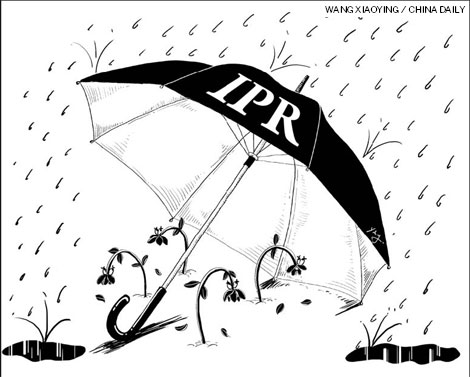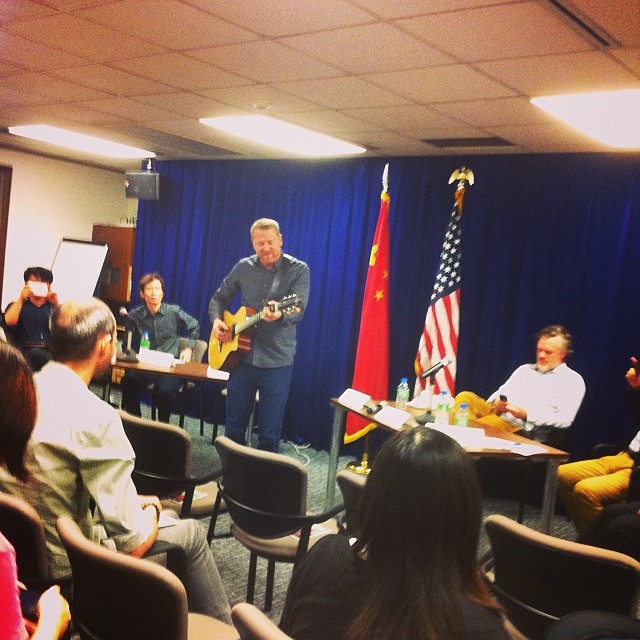On the 26th June just before Cracker’s debut tour in China (a partnership between the US Embassy and Split Works), we attended a panel at the U.S. Consulate in Shanghai concerning something along the lines of the importance of intellectual property (IP) rights in China. We managed to cobble together some takeaways even though the discussion was a little too short to do the subject justice, and lacked a clear direction.
Speakers included:
David Lowery – Cracker front man and copyright evangelist
Archie Hamilton – MD, Split Works / Splatter China
Bill Zang – Vice President, Shanghai Synergy Culture & Entertainment Group
Edward Qi – CEO / Founder, 2 News Net Broadcasting and Technology
Paul Stanley – Moderator
The audience of Cracker fans and consulate staff were eased into the panel by the moderator, who got Lowery to set the scene by describing what was involved in creating a record. He sensibly confessed that actually the majority of the work (and certainly spend) goes into promoting a release.
About five minutes later, what was a discussion swiftly became a contentious debate that centred around the views of Lowery and Hamilton. The debate was nothing radically different from what we’ve seen/heard/read about so many times before. Those who are ‘for’ intellectual property rights are pitched against those of a more egalitarian disposition, who believe IP rights are a vehicle for centralizing power and control.
There was no time to fully explore each of the views presented, though common themes were drawn upon including such points as:
For
- Nations with strong IP frameworks also have strong exports, so IP encourages the development of strong creative economies.
- IP rights are essentially tied to questions of ‘fairness’ and are a key means of enabling artists to get fairly remunerated for their work.
Against
- The near-dissipation of recorded music revenues is tied to natural economic cycles associated with the introduction of new technologies. It’s inevitable and can’t be stopped by introducing (more) IP rights.
- Artists have been successful before because their work was torrented. Piracy is promotion.
We are not going to explore any of these arguments further (even within the context of China) because they have been done to death. Instead we’re going to argue that this kind of binary is totally unproductive. Intellectual property rights exist, they have been in existence since 1710 and they will not go away. The arguments need to move away from “for or against” scenarios. It’s more a question of “to what extent should IP rights be implemented and acted upon?”
Looking at China, if we’re really going to get any value out of these kinds of debates, we need to be asking more pragmatic questions.

Enforcement
China has gotten up to speed pretty quickly with its IP law, out of necessity in order to ascend to the WTO. But that doesn’t mean anybody is acting on the laws that have been established. Anyone who has lived in China will know just how lax things can be in respect of certain laws and regulations. Given the sheer number of people, of SMEs, and the relative immaturity of the regulative landscape, actually enforcing the framework that U.S. media corporations would like to see exist here seems aspirational. It would likely require a provincial-level approach, which would mean entering into separate lobbying efforts each with distinct outcomes. Interpretations of the law would vary and different legal precedents would be drawn upon where disputes arise. Ultimately, what you’d be looking at is building a networked administrative system across provinces mimicking that seen with collection societies in Europe. So there’s a biggie to start.
Enabling Innovation
How can intellectual property rights be enforced in such a way that they enable innovation rather than stymie it? The best example of where this issue has played out is in respect of streaming services. Early entrants to the streaming game in China (just as was the case with Napster) set up, attracted their user bases, and became valuable by virtue of having nurtured an active community of music fans. In markets with strong foundations in protecting IP (the UK and US in particular) start-ups need to pay substantial fees for licenses to collection societies, advance royalty payments to rights owners, and whatever else just to get the ball rolling. It’s a prohibitively risky business. How can the need to increase protection be reconciled with the need to keep barriers to entry low?
Empowering Musicians
Collection societies in the UK and US have done a commendable job educating artists on how they can empower themselves and get the most from their rights. In fact, educating people on what copyright is and what constitutes an infringement in the first place is a big enough task. Another question that needs addressing in future panels on IP in China is how the introduction of amended/new rights translates to empowerment for artists? How can artists use these rights to protect themselves and pursue new opportunities in a mutually beneficial way? Which organization is responsible for educating Chinese creatives and consumers?
Precedents
Many of the guiding principles on how the courts settle disputes in the UK and US are guided by civil law – norms that were established through precedents over a time span of a century. For example, Napster’s demise set a precedent for what constituted an infringing digital service versus a service that was operating fairly according to the affordances safe harbor provisions provide (as per the Digital Millennium Copyright Act – Internet service providers and services like Youtube depend on these). In the case of China, would the courts be willing to import western precedents to guide enforcement? Why should they import western ideals of what constitutes a law-abiding exploitation of another’s rights? Again it’s another crucial questions relating to how the law is put into effect.
Overall, the panel started late and ended on time, so it seemed a bit short. A number of key issues and perspectives were raised leaving the audience with a rough idea of the complexity of the IP debate. There certainly was not enough time for a structured, constructive debate. This particular panel – and many others like it – failed to address the really important issues of enforcement, how IP can encourage innovation, and how IP can enable the empowerment of artists across all creative disciplines.
